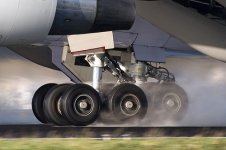I think it's a fairly universal "truth" nowadays that RV and tailer tires should be replaced at a certain age, whether they have 100 miles on them or 100,000. Good tread is no longer an indicator. Apparently age kills the rubber no matter what (although certain things can accelerate it, such as sitting in place [rubber chemicals not getting moved around, IIUC] and UV exposure. As was mentioned above, there is a manufacturing date code on all modern tires (right after the DOT area on one side of the tire, four-digit code signifying week/year). So the thing to look at is that date code, not tread or "they are like new," or whatever. The date code rules.
I'm not sure if car tires have the same guidelines (and I've always put enough miles on them to be getting new tires inside of 6 years anyway). Given how hard it is to find "decent" trailer tires these days (I would like to find radials made in the US, but cannot), I will likely put new tires on the boat trailer in 3-4 years, not even 6.

